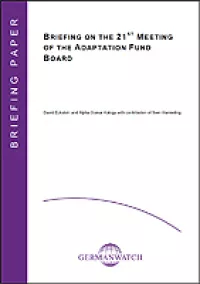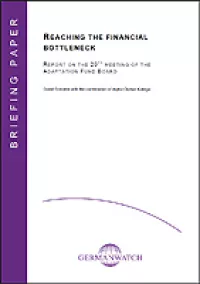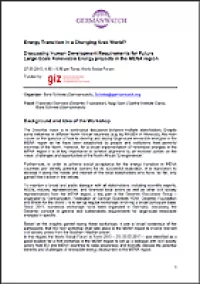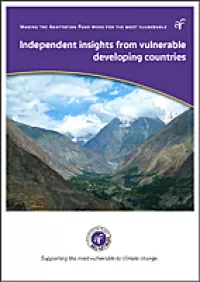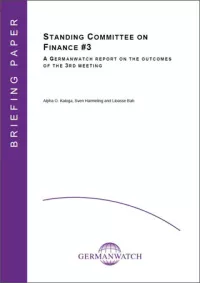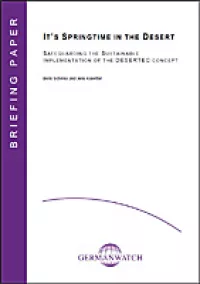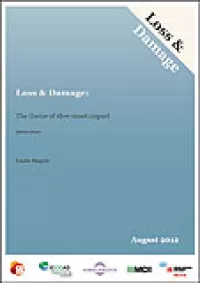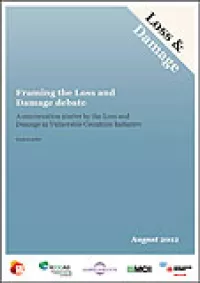Aktuelles zum Thema
Publication
This briefing paper summarizes the key issues on the agenda for the 21st meeting of the Adaptation Fund Board, which governs the Adaptation Fund set up under the Kyoto Protocol. The meeting will be held in Bonn, Germany from July 1-4, 2013.
News
International Conference on 2nd July 2013
The conference hosted by the Adaptation Fund NGO Network will serve as an exchange platform between political decision-makers and civil society, between academia and UN institutions on the experience with implementing such adadaptation measures, in the Adaptation Fund and beyond.
Publication
Report on the 20th meeting of the Adaptation Fund Board
The Adaptation Fund (AF) was established under the Kyoto Protocol of the UN Framework Convention on Climate Change (UNFCCC) in order to finance concrete adaptation projects and programmes in developing countries affected by the global climate change. This report summarizes the key decisions taken during the 20th meeting (April 4-5, 2013) of the Adaptation Fund Board (AFB).
Publication
Discussing Human Development Requirements for Future Large-Scale Renewable Energy projects in the MENA region
This paper is based on the inputs given by different civil society actors during the workshop “Energy transition in a changing Arab World? Discussing human development requirements for future large scale RE projects in the MENA region” at the World Social Forum in Tunis in 2013. Based on the questions that arose during the workshop it must be stated, that low levels of civil society participation, information and transparency within the realization and communication of Desertec are still causing many question marks, concerns and doubts among the civil society in the Southern Mediterranean.
Publication
Making the Adaptation Fund work for the most vulnerable
This publication summarises the state of play in the Adaptation Fund and the key experiences of members of the Adaptation Fund NGO Network, at international policy level as well as within developing countries.
Publication
A Germanwatch report on the outcomes of the 3rd meeting
The third meeting of the Standing Committee on Finance (SCF) took place in Bonn from the 8th to the 10th March 2013. The SCF has been established by the Conference of the Parties to the UNFCCC to assist the Conference of Parties (COP) in exercising its functions with respect to the financial mechanism of the Convention. Certain outcomes...
Publication
Safeguarding the Sustainable Implementation of the DESERTEC Concept
This paper provides an overview of discussions on how to safeguard the sustainable implementation of the DESERTEC concept through the application of a sustainability framework.
Publication
The Adaptation Fund (AF) was established under the Kyoto Protocol of the UN Framework Convention on Climate Change (UNFCCC) in order to finance concrete adaptation projects and programmes in developing countries affected by the global climate change. This report summarises the key decisions taken during the 19th meeting (December 11 to 14) of the Adaptation Fund Board.
Publication
This policy briefing sets out a number of the issues relating to the slow onset portion of the climate change loss and damage agenda. It is not meant to be an exhaustive analysis of this new and sometimes complex subject. Instead, it should serve to introduce the concept of loss and damage related to slow onset climate change hazards and provide sign posts to guide further investigation of the subject – in particular for those institutions, experts and country representatives participating in the current work programme on loss and damage under the UN Framework Convention on Climate Change (UNFCCC).
Publication
A conversation starter by the Loss and Damage in Vulnerable Countries Initiative, Advance version
This document outlines initial thoughts by the ‘Loss and Damage in Vulnerable Countries Initiative’ to provide some conceptual and framing input into the loss and damage negotiations under the UNFCCC. Given both the preliminary nature of these discussions and the complexity of the issue of loss and damage, a precise definition may not be necessary and in fact may even be counter-productive at this early stage. Instead at this point in the discussion it may be more useful provide a spectrum of relevant scientific and policy perspectives and areas of expertise in an attempt to inform ongoing dialogue.

